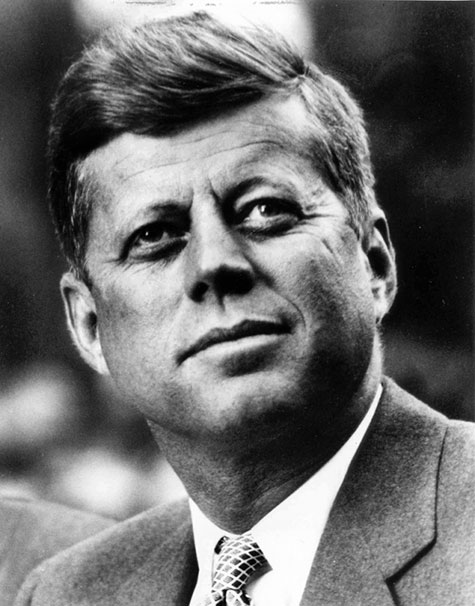
The music begins quietly, a soft, solemn adagio. It gathers force, building to moments of shock and anger before resolving, at last, into mournful acceptance.
Written in 1964, Ronald Lo Presti’s “Elegy for a Young American,” which the composer dedicated to John F. Kennedy, predates Elisabeth Kübler-Ross’ On Death and Dying by five years. Yet it many ways, it anticipates her famous “Five Stages of Grief,” capturing the ragged, see-saw emotions of a traumatized nation.
On Friday, Nov. 22, the U.S. Air Force Band of Mid-America and the Washington University in St. Louis Wind Ensemble will mark the anniversary of Kennedy’s assassination with “Legacy: JFK 50 Years Later.”
The Wind Ensemble, conducted by Chris Becker, will open the program with Andrew Boysen’s “Kirkpatrick Fanfare” (1999), a sweeping, Irish-tinged work based in part on the traditional song “Danny Boy.”
Next comes “Elegy for a Young American,” followed by “Where Never Lark Nor Eagle Flew,” James Curnow’s setting of a poem by a World War II fighter pilot.
Then, the Air Force Band, conducted by Maj. Cristina Moore Urrutia and 2nd Lt. Wilson Wise, will perform Karel Husa’s “Smetana Fanfare” (1984), followed by Warren Benson’s “The Leaves Are Falling” (1964), written in response to Kennedy’s assassination; and “Summon The Heroes,” John Williams’ theme for the 1996 Olympic games.
Finally, the two ensembles will join forces for excerpts from James Horner’s score to the film Apollo 13 (1995) and Carmen Dragon’s 1963 arrangement of “America the Beautiful.”
Concluding the program will be Frederick Fennell’s 1981 arrangement of Edwin Eugene Bagley’s iconic “National Emblem.”
“Legacy: JFK 50 Years Later” begins at 7:30 p.m. in the E. Desmond Lee Concert Hall of WUSTL’s 560 Music Center. The performance is free and open to the public and is sponsored by the Department of Music in Arts & Sciences.
The 560 Music Center is located at 560 Trinity Ave. in University City. For more information, call (314) 935-5566 or email daniels@wustl.edu.